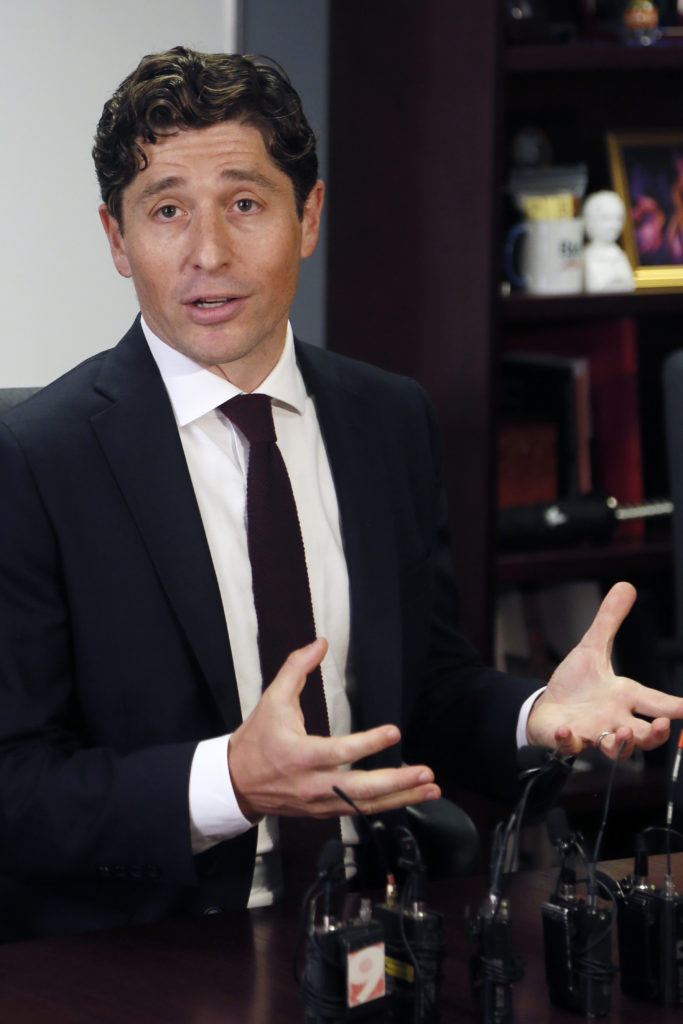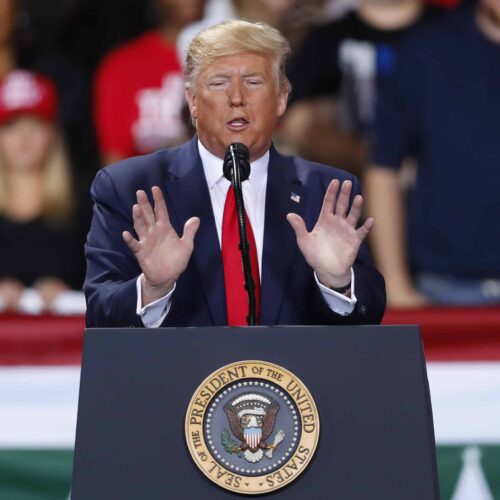This article is published in partnership with NBC News
Introduction
The Center for Public Integrity is a nonprofit newsroom that investigates betrayals of public trust. Sign up to receive our stories.
Here’s how some city leaders say President Donald Trump could immediately help them grapple with the coronavirus crisis: Pay bills they already sent his campaign committee months or years ago.
Fourteen municipal governments — from Albuquerque, New Mexico, to Wildwood, New Jersey — want Trump’s campaign committee to clear a combined $1.82 million worth of public safety-related debt connected to Trump’s “Make America Great Again” campaign rallies, according to interviews with local officials and municipal records obtained by the Center for Public Integrity.
The Trump campaign’s tab is now more than double what Public Integrity first reported in June.
Cities are girding for a coronavirus-induced financial disaster, with a new study from the National League of Cities and U.S. Conference of Mayors indicating more than 2,100 U.S. cities are anticipating significant budget shortfalls and widespread cuts to local government programs and staff. These cuts are likely to fall hardest on low-income residents, people of color, the homeless and the disabled, who are suffering disproportionately from the pandemic.
Campaigns should always reimburse already cash-strapped cities for police and public safety costs, argued Minneapolis Mayor Jacob Frey, whose city wants the Trump campaign to pay nearly $543,000 stemming from an Oct. 10 rally.
“But during this crisis, that loss is even more pronounced — $150,000, for instance, could pay for emergency rental assistance for 100 Minneapolis families,” Frey told Public Integrity this week.
“Without this money, we cannot help our most vulnerable, and I guarantee we do not have enough money to prevent lives lost and homes lost,” said Kate Burke, a city council member in Spokane, Washington, which has been waiting since 2016 for the Trump campaign to pay more than $65,000.
“Any revenue received would be helpful to our general fund, which supports the majority of our operating costs,” said Rebecca Fleury, city manager of Battle Creek, Michigan, which billed the Trump campaign more than $93,000 for public safety services related to a Trump campaign rally in December.
Trump frequently touts his support for law enforcement.

“I love you guys, whether you’re cops, police officers, law enforcement — I’ll call you whatever you want, it doesn’t matter. You are so great, so respected,” Trump said during his rally in Minneapolis.
“Nobody appreciates you more than the president of the United States,” Trump told law enforcement officials on Law Enforcement Appreciation Day in January.
But in a statement to Public Integrity, the Trump campaign indicated it’s not responsible for reimbursing cities for police and public safety costs associated with its spirited, and sometimes boisterous rallies — the president’s favored venue for connecting with supporters.
“It is the U.S. Secret Service, not the campaign, which coordinates with local law enforcement. The campaign itself does not contract with local governments for police involvement. All billing inquiries should go to the Secret Service,” the statement said.
Secret Service officials, however, said that they receive no funding from Congress to reimburse municipal governments for the local public safety protection they request.
The Trump campaign did not say whether it supports Congress appropriating federal tax dollars to reimburse municipal governments for protecting people at future presidential campaign rallies.
In the meantime, Trump’s campaign should both pay Tucson, Arizona, the nearly $82,000 for a March 2016 campaign rally and prioritize helping all cities contend with coronavirus-ravaged budgets, Tucson spokesperson Lane Mandle said.
“What the City of Tucson needs, like every major municipality, is a direct infusion of cash from the federal government that can be put toward our general fund to offset the millions currently being lost in sales tax revenue,” Mandle said.
“We’re a small, seasonal resort. It’s all a scary proposition,” said Wildwood Mayor Pete Byron, whose city of about 5,000 residents is invoicing the Trump campaign for $33,900 following a campaign rally on Jan. 28. “The president could help now.”
Some candidates pay — others don’t
Following his inauguration in January 2017, Trump immediately launched his 2020 re-election effort. No other president has started so early.
Trump has since conducted nearly 90 large-scale campaign rallies — although both Trump and presumptive Democratic nominee Joe Biden have suspended in-person campaign events since mid-March, when states began limiting the sizes of public gatherings in response to spiking COVID-19 infections.
Many cities that hosted Trump rallies chose not to bill his campaign for police and public safety costs, explaining they have policies against doing so or didn’t bother because of Trump’s history of nonpayment.
Alternatively, several — including Nashville — required the Trump campaign to sign a contract and prepay police costs because Trump planned to appear at a city-owned facility.
But Trump often gathers his political flock at private venues. And if city officials want to recoup often significant costs associated with protecting these rallies, they must bill the Trump campaign after the fact and hope it will pay.
When the Trump campaign does not pay, local taxpayers are left to absorb costs they effectively cannot avoid, as municipal leaders say they are duty bound to secure and protect any large gathering within their cities’ limits.
Some recent presidential candidates, including Republican Ted Cruz in 2016 and Democratic also-rans Elizabeth Warren, Kamala Harris, Cory Booker, Beto O’Rourke and Pete Buttigieg in 2020 routinely paid police bills municipal governments sent their campaigns. They argued it was the right thing to do, even if their campaigns weren’t legally obliged.
President Barack Obama and 2016 Democratic presidential nominee Hillary Clinton paid some police bills, but not others. Likewise, Sen. Bernie Sanders, who dropped out of the 2020 race this week, has a checkered history of paying such bills.
For example, both the Clinton and Sanders campaigns of 2016 still have pending invoices from Spokane, said Marlene Feist, the city’s public works director of strategic development.
Biden’s campaign, which has primarily conducted small-scale political events during the 2020 campaign, has paid several municipalities and school districts several thousands of dollars during the past year for “event security,” Federal Election Commission records indicate. The Biden campaign has also paid New York-based private security firm T&M Protection Resources more than $312,000, according to federal records.
The Biden campaign did not respond to requests for comment about whether it will honor public safety-related invoices it receives from municipalities that host Biden’s general election campaign events.
Such gatherings — if they’re allowed to occur — will likely be notably larger, and demand significantly more public safety presence, than Biden’s primary events.
Moe Vela, who served in the White House as Biden’s vice presidential senior adviser and director of management and administration, said both the Trump and Biden campaigns should pay police bills sent by municipalities.
“No double standards,” Vela said.
Forcing Trumps hand?
Politicians at all levels of government are now attempting to compel the Trump campaign specifically — and presidential campaigns generally — to pay their bills.



Join the conversation
Show Comments